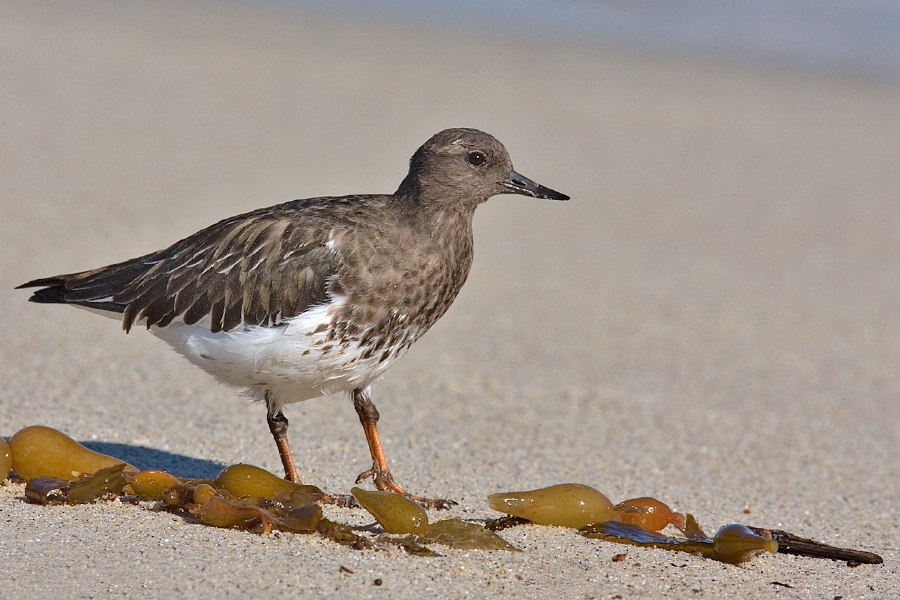- Turnstone
image_width = 205px
image_caption = Ruddy Turnstone in nonbreeding plumage

image2_width = 205px
image2_caption = Black Turnstone in winter plumage
regnum =Animal ia
phylum =Chordata
classis =Aves
subclassis =Neornithes
infraclassis =Neoaves
ordo =Charadriiformes
subordo = Scolopaci
familia =Scolopacidae ("partim")
genus = "Arenaria"
genus_authority = Brisson, 1760
subdivision_ranks =Species
subdivision = "Arenaria interpres " "Arenaria melanocephala "Turnstones are the bird
species in thegenus "Arenaria" in the familyScolopacidae . They are closely related tocalidrid sandpipers and might be considered members of the tribe Calidriini .Thomas "et al" (2004)]Both birds are distinctive medium-sized
wader s. They are highArctic breeders, and are migratory. These chunky powerful birds have strong necks and bills well suited to their feeding technique. As the name implies, these species readily turn stones or seaweed looking for hiddeninvertebrate s. They are strictly coastal, preferring stony beaches to sand, and are often found with other waders such asPurple Sandpiper s.Their appearance is striking in flight, with white patches on the back, wings and tail.
The
Ruddy Turnstone (or just Turnstone inEurope ), "Arenaria interpres", has a circumpolar distribution, and is a very long distance migrant, wintering on coasts as far south asSouth Africa andAustralia . It is thus a common sight on coasts almost everywhere in the world.In breeding
plumage , this is a showy bird, with a black-and-white head, chestnut back, white underparts and red legs. The drabber winter plumage is basically brown above and white below.This is a generally tame bird and is an opportunist feeder. Unlike most waders, it will scavenge, and has a phenomenal list of recorded food items, including human corpses and
coconut .The call is a staccato "tuck- tuck- tuck".
The Ruddy Turnstone is one of the species to which the "Agreement on the Conservation of African-Eurasian Migratory Waterbirds" (
AEWA ) applies.The
Black Turnstone ("Arenaria melanocephala") has a similar structure to its widespread relative, but has black upperparts and chest, and white below. It has a much more restricted range than the Ruddy Turnstone, breeding in westernAlaska , and wintering mainly on the Pacific coast of the USA.There exists a
fossil bone, adistal piece oftarsometatarsus found in theEdson Beds ofSherman County, Kansas . Dating from the mid-Blancan some 4-3 million years ago, it appears to be from a calidriid somewhat similar to aPectoral Sandpiper , but has some traits reminiscent of turnstones. [Wetmore (1937)] Depending on which traits areapomorph ic andplesiomorph ic, it may be an ancestral representative of either lineage.Footnotes
References
* (2004): A supertree approach to shorebird phylogeny. "BMC Evol. Biol." 4: 28. doi|10.1186/1471-2148-4-28 [http://www.pubmedcentral.org/picrender.fcgi?artid=515296&blobtype=pdf PDF fulltext] [http://www.pubmedcentral.org/articlerender.fcgi?artid=515296#supplementary-material-sec Supplementary Material]
* (1937): The Eared Grebe and other Birds from the Pliocene of Kansas. "Condor" 39(1): 40. [http://elibrary.unm.edu/sora/Condor/files/issues/v039n01/p0040-p0040.pdf PDF fulltext] [http://elibrary.unm.edu/sora/Condor/files/DJVU/v039n01/P0040-P0040.djvu DjVu fulltext]External links
* [http://www.birds.cornell.edu/AllAboutBirds/BirdGuide/Ruddy_Turnstone.html Ruddy Turnstone] - Cornell Lab of Ornithology
* [http://www.mbr-pwrc.usgs.gov/id/framlst/i2830id.html Ruddy Turnstone "Arenaria interpres"] - USGS Patuxent Bird Identification InfoCenter
* [http://www.sdakotabirds.com/species/ruddy_turnstone_info.htm Ruddy Turnstone Information] - South Dakota Birds and Birding
Wikimedia Foundation. 2010.

